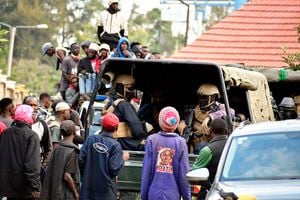
Kenyan police officers patrol as part of a peacekeeping mission, in Port-au-Prince, Haiti, July 17, 2024.
Nearly two months ago, a contingent of the Kenyan Police arrived in the Caribbean nation of Haiti to help end the terror of armed gangs that have brought the long-suffering country to its knees.
The 400 Kenyans police are the advance and lead of a six-country United Nations-mandated Multinational Security Support (MSS) Mission that seeks to restore peace to Haiti.
Despite early criticisms and scepticism, the Kenyan contingent was heartily welcome in a country where more than 2,500 people were killed or injured in gang violence from January through March alone. Between March and June, the number of internally displaced people in Haiti increased from 362,000 to 578,000.
Now, the mood has soured. Haitians are angry with the force and the Haitian police because they have not decisively moved against the gangs, their leaders and their known hideouts. The BBC reported that the force is being accused of “theatrics” and dismissed as mere “tourists”.
UN rules of engagement
The Kenyan force is operating under UN rules of engagement, which are heavy on respect for human rights and restraint in the use of force. The force cannot, for example, surround a gang camp in the night and attack at dawn, burning it down.
That is a noble thing, but it is unsuited to the challenges of dealing with modern bad actors, who operate with a level of violence and the weaponry of deadly rampaging armies. In places like Haiti, there is little choice between velvet-gloved peacekeeping and a firm-handed approach.
The former ends in expensive failure, as witnessed in the Democratic Republic of Congo, with the $1.13-billion-a-year UN Peacekeeping mission, which has been running for 14 years. The only real alternative for Kenya, then, is to bite or stay out.
There is an example back in Africa, in the Central African Republic, that we have reported on before, that illustrates the point.
In CAR, President Faustin-Archange Touadera was in trouble. With elections approaching on December 27, 2020, one of the country’s many rebel groups, the Coalition of Patriots for Change (CPC), increased their attacks and called on him to suspend the polls. Voting went ahead, and Touadera was re-elected. By mid-January 2021, the CPC rebels were closing in on the capital Bangui. Since its independence from France in August 1960, the country has seen government change through nearly a dozen coups and armed rebellions.
This time, though, a UN peacekeeping force had been well-established in the country. It had 21 countries participating, including three East African Community States—Burundi, Tanzania and Rwanda.
Ahead of the December polls, the UN said it had to be neutral, and couldn’t continue protection for Touadera. With rebels closing in and fearing it was a plot to expose him to assassination, Touadera called for Russian help, and the private security company Wagner, pitched up. Touadera also decided he needed African help and called Rwanda. Because Rwanda already had a UN force in CAR, it sent a battalion under a separate bilateral agreement.
The UN had instructed its contingents not to engage the rebels. Some peacekeepers had previously given up their arms when confronted by insurgents—except the East Africans who had a “die with a gun in our hands” policy. Moving from the Chad border southward, the rebels avoided the Burundians and Tanzanians, approaching Bangui from two directions. Along the way, other peacekeepers heeded advice to do nothing or slunk away. Bangui, however, was mostly controlled by the Rwandan forces.
With the rebels nearing the capital, a familiar scene played out. CAR soldiers dropped their uniforms and melted away in the darkness. Several senior army officers shifted loyalties. Ministers and officials took off for the villages. The Bangui people stayed home, leaving the streets deserted. Touadera looked like he was about to be jobless.
Rebels
The Rwandan UN force was pondering the do-nothing orders when the rebels gifted them, attacking their convoy that was delivering breakfast to its troops in the north of the capital. Acting in “self-defence,” the Rwandan peacekeepers eliminated the rebels’ northern axis. The western axis came upon the main bridge leading to Bangui. The Rwandan bilateral force was at the bridge. The rebels attacked.
Unrestrained by the restrictions placed on its UN counterparts, the Rwandan bilateral force unflinchingly decimated the rebels. It was the first such attack to be foiled in the CAR’s troubled history. The CAR people were dumbfounded. They didn’t think it was possible. Touadera survived. CAR didn’t return to a peaceful paradise, but it lived to fight another day. A faltering national dialogue to reach a political consensus finally got underway. Parts of the economy and society continued to recover.
The Kenyan police likely now know that there is no pretty, Nobel Peace Prize-worthy way to quell the Haiti gangs. The question is, what will they do about it?
The author is a journalist, writer and curator of the “Wall of Great Africans”. @cobbo3










